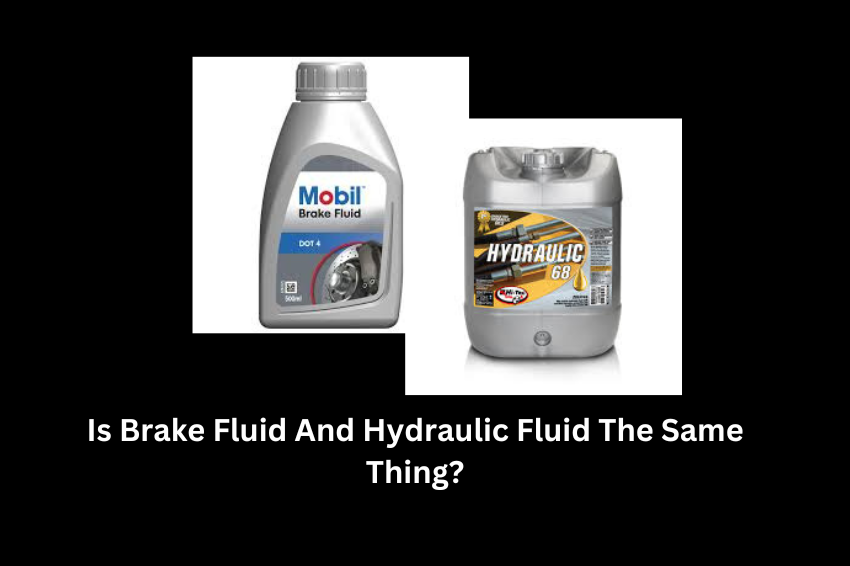No, brake fluid and hydraulic fluid are not the same. Brake fluid is specifically designed for high-temperature braking systems, while hydraulic fluid is used in various systems with different pressure and temperature requirements. Mixing them can damage components.
Difference Between Brake Fluid And Hydraulic Fluid
| Feature | Brake Fluid | Hydraulic Fluid |
| Primary Function | High-pressure braking system operation | Power transmission in various systems (e.g., clutches, construction equipment) |
| Composition | Glycol-ether based, hygroscopic (absorbs moisture) | Mineral oil-based (petroleum) or synthetic |
| Boiling Point | Extremely high (DOT 3: 267°C, DOT 4: 230°C) | Varies depending on application (typically lower than brake fluid) |
| Viscosity | Relatively low, for efficient pressure transfer | Varies depending on application, and can be thicker for higher pressure systems |
| Compatibility | Not compatible with other fluids, mixing can damage components | Can be compatible with some other hydraulic fluids, check the manufacturer’s recommendations |
| Moisture Sensitivity | Highly sensitive, absorbs moisture over time, leading to decreased boiling point and potential brake failure | Less sensitive, but some hydraulic fluids can degrade with moisture contamination |
Function:
Brake fluid is specifically designed for the harsh environment of a car’s braking system.
It needs to withstand the extreme temperatures generated during braking to ensure efficient transfer of force from the pedal to the brakes.
On the other hand, hydraulic fluid is used in various systems where power needs to be transmitted, such as clutches or construction equipment.
The specific requirements for hydraulic fluid vary depending on the application.
Composition:
Brake fluid is typically glycol-ether based, which makes it hygroscopic, meaning it attracts and absorbs moisture from the air.
This moisture absorption is important for its lubricating properties but also necessitates regular changes as moisture content can lower the boiling point.
Hydraulic fluid can be mineral oil-based (petroleum) or synthetic, with varying properties depending on the application.
Boiling Point:
Brake fluid has a very high boiling point (DOT 3: 267°C, DOT 4: 230°C) to ensure it doesn’t vaporize under the intense heat generated during braking.
Vaporization would create compressible gas bubbles in the system, leading to a spongy brake pedal and potential brake failure.
Hydraulic fluid has a lower boiling point that varies depending on its specific use.
Viscosity:
Brake fluid has a relatively low viscosity for efficient transfer of pressure throughout the braking system.
Hydraulic fluid can have a wider range of viscosities depending on the application.
Thicker fluids might be used in high-pressure systems for better lubrication and sealing.
Compatibility:
Brake fluid is not compatible with other fluids, and mixing it with other types of fluid can damage components in the braking system.
Hydraulic fluid can sometimes be compatible with other hydraulic fluids, but it’s important to always consult the manufacturer’s recommendations to avoid compatibility issues.
Moisture Sensitivity:
Brake fluid is highly sensitive to moisture.
As it absorbs moisture over time, its boiling point decreases, compromising braking performance and potentially leading to brake failure.
Hydraulic fluid is generally less sensitive to moisture, but some types can still degrade if contaminated with water.
Can I Use Hydraulic Fluid In My Brakes?
No, you should not use hydraulic fluid in your brakes.
Hydraulic fluid and brake fluid are two completely different substances, each designed for specific purposes.
While they might look similar, they have different properties that make them unsuitable for each other’s jobs.
Why can’t you use hydraulic fluid in your brakes?

Brake fluid is made to handle the extreme heat and pressure created when you hit the brakes.
Hydraulic fluid isn’t designed for this.
Using hydraulic fluid in your brakes can cause it to break down faster, leading to problems.
Hydraulic fluid can damage the rubber seals in your brake system.
These seals are important for keeping brake fluid where it needs to be.
If they’re damaged, you could lose brake fluid, which is very dangerous.
Hydraulic fluid can cause corrosion in your brake system.
This can weaken the metal parts and make them more likely to fail.
Hydraulic fluid doesn’t have the same properties as brake fluid, so, it won’t work as well at transferring pressure to your brakes, leading to longer stopping distances.
What Happens If You Use Hydraulic Fluid In Your Brakes?
Using hydraulic fluid in your brakes can have serious consequences.
You could experience:
- Spongy brake pedal
- Reduced braking power
- Brake failure
It’s essential to always use the correct type of brake fluid in your car.
Check your owner’s manual to find out the right type for your vehicle.
If you’re unsure, consult a mechanic.
